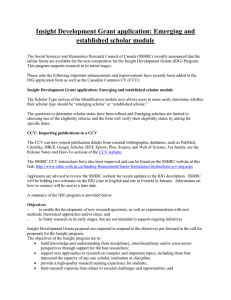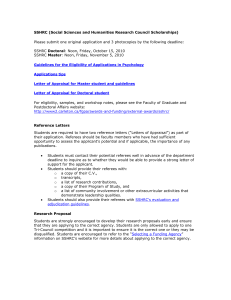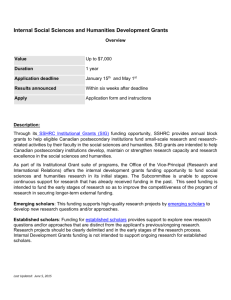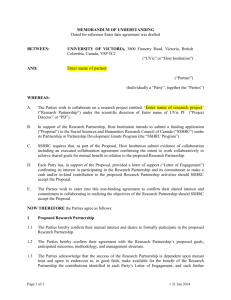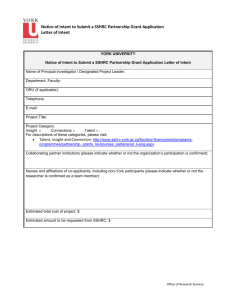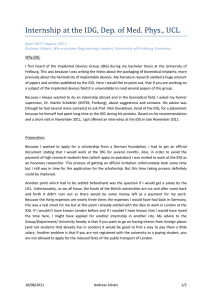Social Sciences and Humanities Conseil de recherches en Research Council of Canada
advertisement
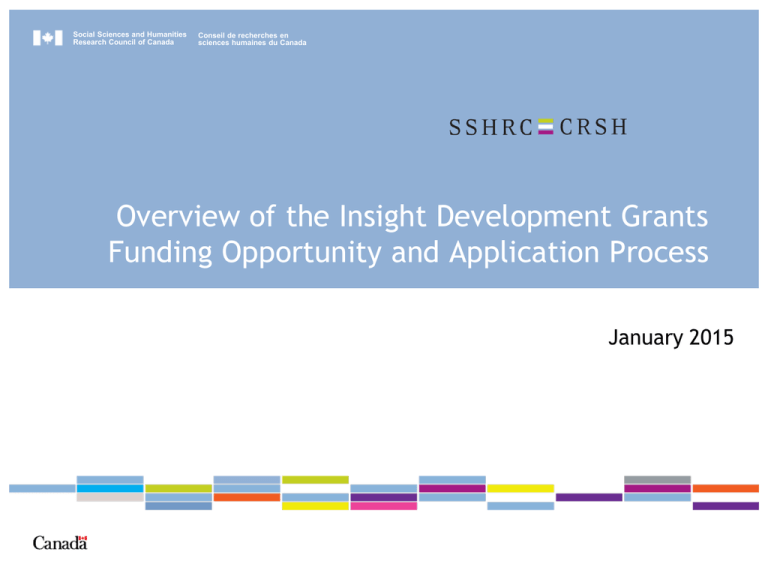
Social Sciences and Humanities Research Council of Canada Conseil de recherches en sciences humaines du Canada Overview of the Insight Development Grants Funding Opportunity and Application Process January 2015 Insight Grants Program: Objectives build knowledge and understanding from disciplinary, interdisciplinary and/or cross-sector perspectives through support for the best researchers; support new approaches to research on complex and important topics, including those that transcend the capacity of any one scholar, institution or discipline; provide a high-quality research training experience for students; fund research expertise that relates to societal challenges and opportunities; and mobilize research knowledge, to and from academic and nonacademic audiences, with the potential to lead to intellectual, cultural, social and economic influence, benefit and impact. 2 Insight Development Grants (IDG) Objectives: To support research in its initial stages conducted by emerging and/or established scholars To enable the development of new research questions, as well as experimentation with new methods, theoretical approaches, and/or ideas may include case studies, pilot initiatives, and critical analyses of existing research IDG: Features Applicant: Principal investigator alone or with a team International co-applicants Duration: 1 to 2 years Value: Up to $75,000 Funding: Separate budgetary envelope for Emerging Scholars (minimum 50% of overall envelope) Application process: One-stage application 4 IDG Applicants: Emerging Scholars Emerging Scholars must demonstrate that they have not applied successfully, as principal investigator or project director, for a grant through any of SSHRC’s funding opportunities. And they must meet at least one of the following criteria: • have completed their highest degree no more than five years before the competition deadline (SSHRC considers only the date of completion of the first doctorate); or • have held a tenured or tenure-track university appointment for less than five years; or • have held a university appointment, but never a tenure-track position (in the case of institutions that offer tenure-track positions); or • have had their careers significantly interrupted or delayed for family reasons. Emerging Scholar Research • grants are developmental in the sense of their offering a chance for emerging scholars to develop their career. • research can be but need not be wholly new – extension of thesis research is possible. IDG Applicants: Established Scholars Established Scholars • Have either established or had the time and opportunity to establish a record of research achievement. Established Scholar Research • Novelty of research more significant for established scholars. Must clearly demonstrate how proposed research differs from previous research. • Enables them to conduct work in new areas, in new ways, to do pilot studies, etc., without being penalized for lack of experience in the new area. • Does not support ongoing research by established scholars. IDG Evaluation Criteria Challenge: The aim and importance of the endeavour (50%) Feasibility: The plan to achieve excellence (20%) Capability: The expertise to succeed (30%)* * No weighting of sub-criteria *Lower weighting of CV compared to Insight Grants Scoring Table (New) Excellent Very good Good Satisfactory Moderate Unsatisfactory IDG Adjudication Committees Multidisciplinary committees (no committees based on former “priority areas” except for aboriginal research if sufficient applications received). Number of committees is based on number of applications received. Three Readers, assigned based on expertise and suitability. Optional cross-committee evaluation for multidisciplinary applications (1 page justification must be submitted by applicant). IDG Detailed Description Guidelines: Provide clear and precise questions and objectives: what do you want to do and why? Why is it important? Include complete literature review that serves to situate what you will be doing. Outline theoretical or conceptual framework. Ensure methodology makes sense in terms of objectives and personnel involved. Explain all key terms and concepts. *Important: all committees are multidisciplinary. 10 Adjudication Process Step 1: Eligibility review (SSHRC staff responsibility) o o o o Applicant eligibility Subject matter eligibility (see guidelines) Multiple applications (see regulations) Ineligible expenses: if > 30% of requested budget is ineligible (e.g. salaries for team members, funds for curriculum development), the application will be declared ineligible Eligibility decisions are final and do not constitute grounds for appeal. 11 Adjudication Process calibration exercise preliminary scores submitted by readers Preliminary ranking established – emerging and established scholars ranked separately Flagging process: for applications ranked in bottom 30% Committee discussion Final ranking 12 IDG Feedback Provided Applicants receive: • • • • Result letter Notice of Decision (if successful) Committee Evaluation form (where applicable) Committee statistics. IDG Deadline February 2, 2015 (8 p.m. Eastern) Internal university deadline – contact your research office! Multiple Applications and Re-applications Applications submitted as an applicant IDG Feb 2015 + IG Oct 2015 = IG Oct 2014 + IDG Feb 2015 = Objectives must be different There is no limit to the number of applications as a Coapplicant or Collaborator. Grant holders may re-apply to the same funding opportunity in the final year of funding. Automatic one-year extension for all grants. 15 Contacts and Useful information Multiple Applications Regulation: http://www.sshrccrsh.gc.ca/funding-financement/policies-politiques/multiple_appsdemandes_multiples-eng.aspx Institutional eligibility: For postsecondary institutions or not-for-profit organizations that are not yet eligible yet wish to administer SSHRC grants. Contact: secretariat@sshrc-crsh.gc.ca Tri-Agency Financial Administration Guide: http://www.nserccrsng.gc.ca/Professors-Professeurs/FinancialAdminGuideGuideAdminFinancier/index_eng.asp Sports Participation Research Initiative: http://www.sshrccrsh.gc.ca/funding-financement/programs-programmes/sport_caneng.aspx Competition Statistics: http://www.sshrc-crsh.gc.ca/resultsresultats/stats-statistiques/index-eng.aspx? Social Sciences and Humanities Research Council of Canada Conseil de recherches en sciences humaines du Canada Insight Development Grants Application Process SSHRC’s Research Portal and Canadian Common CV 17 We have listened to your feedback! Improvement of scholar type module. Additional fields added and improved ability to import publications into SSHRC CCV template Clearer instructions for SSHRC CCV and posting of these SSHRC-specific instructions on CCV website Simplified steps to upload SSHRC CCV Cleaner look of PDF application and SSHRC CCV (including bookmarks to facilitate navigation) Enhanced search functionality in research portal and SSHRC CCV. Test organization available. 18 Steps to Apply for an IDG 1. Open an account in the in the Research Portal and create an IDG application. 2. Invite co-applicants and collaborators early (if applicable). They need to complete a SSHRC Canadian Common CV (CCV) and attach it to the application. 3. Create and upload your SSHRC CCV to the application. 4. Complete and validate the application. 5. Submit the application to your research office. – Research office vets and forwards application to SSHRC. – Check with your RGO for internal deadlines. 19 Research Portal Home Page - Applications 20 Research Portal Application Overview – Application 21 Research Portal Application Overview Attachments Click on Attach or Edit to view Instructions for attachments Clearer instructions You can delete an attachment and upload a new one if you click on Edit 22 Research Portal Application Overview – Canadian Common CVs Attached 23 Research Portal Application Overview - Invitations 24 SSHRC CCV Instructions Mandatory and non mandatory information http://www.sshrc-crsh.gc.ca/funding-financement/formsformulaires/instructions/ccv-eng.aspx 25 SSHRC CCV Only contributions from last 6 years will be imported 26 SSHRC CCV 27 SSHRC CCV 28 Help Insight Development Grants Tel: 613-996-6976 Email: insightdevelopment@sshrc-crsh.gc.ca For Technical Help, Help with Online Forms: Tel: 613-995-4273 webgrant@sshrc-crsh.gc.ca
